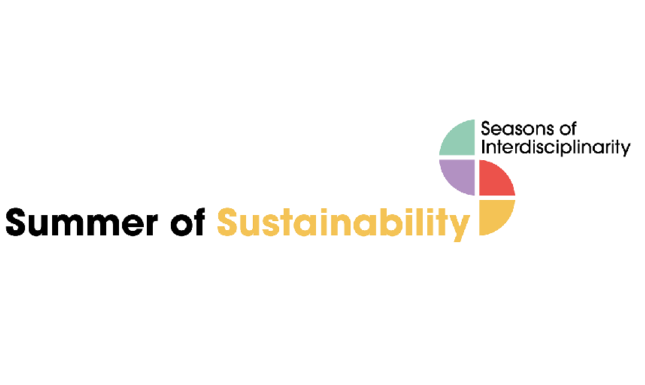Marking the (late) Summer of Sustainability at YAL
The summer of 2021 arrived on the tail end of a global pandemic that has left us all reeling and trying to reassess our relationship to each other, ourselves, and the other life forms that make up our planet.
In the early months of lockdowns that marked most of 2020, and which brought a halt to life as we mostly knew it, some of us rejoiced a little at the silver lining offered by news of drastic reductions in CO2 emissions and the return of bird song in some of the world’s most polluted cities. The summer of 2021, however, quickly reminded us of the devastating impacts of ongoing changes to the global climate; severe flooding in Western Europe, raging fires across North America and Greece, and devastating hurricanes and record snowfall in Madrid dominated the news once more.
As part of our commitment to thinking interdisciplinary about the great challenges facing the world today, members of the Young Academy Leiden designated this summer as one of more intensive reflection on sustainability and our role as scholars, teachers, and citizens in these debates. It is well known that a significant portion of CO2 emissions stem from commercial flights. Academics who are in the early stages of their career depended greatly on international conferences for making their work known, building and maintaining collaborative networks, promoting their publications, and even securing job interviews.

However, YAL also wants to push beyond this focus into related areas where we can mobilize our voices and bring about meaningful change. Here are a few ideas and reflections offered by three of our members. At YAL, we will continue to pursue these ideas and conversations beyond this ‘season’, through teaching (a collaboration with the Honours Academy and the Citizen Science Lab) and as consulting partners for the European Academies (ALLEA) concerning a project on climate sustainability in the academic system.
Noel de Miranda, Immunogenetics Research Project Leader, Leiden University Medical Centre
Before COVID hit, I used to travel quite a bit for work. In 2019, I attended meetings in Spain, United States, Canada, Switzerland, Germany, and France, among other countries. Somewhere during that summer, I travelled to Beijing on a Thursday night and was back, in the Netherlands, the following Sunday (!!!). It was too much, for my own sanity, but also for the planet.
Aside from work, I am a keen traveler. I try to visit a “special place” somewhere in the world at least once a year. For me, a special place is somewhere where I can enjoy nature, wildlife, and a dark sky. The thought that my travel (and other) behavior jeopardizes the sustainability of the world haunts me.
Travel and networking are essential in science. More than using meetings and conferences to present my work, I use them to establish professional and personal ties. I prefer collaborators that I can connect with also at a personal level. Establishing these connections through videoconferencing is a skill that I have not mastered yet and I doubt that I will ever will. On the other hand, I have witnessed how the development of online scientific meetings has democratized science and levelled the playing field. The fact that anyone (provided they can afford registering) can attend a conference being held anywhere in the world is a huge step forward.
For everything there are pros and cons. We travel too much but we need to meet others. Some of my 2019 meetings could have been held online, others not. Compromises have to be made. Two years ago, I proposed the rule in my research group that work-related travels lasting less than six hours by train would not be reimbursed when travelling by plane. Unfortunately, six hours do not bring you very far in Europe: a travel between Amsterdam and Berlin takes a little less than six hours in a train that undergoes a locomotive change at the border and has no WIFI on board (yes, we are in 2021). At the same time, airliners receive major support and tax breaks that make the choice between flying or using the train within Europe a no-brainer for travelers.
Being able to travel anywhere in Europe by train, with comfortable and fast trains, would be a major step forward for the environment but also for our well-being (who enjoys airports?). China currently has more than 35.000 km of high-speed rail tracks that span most of east China. At speeds around 300 km/h we would do Amsterdam-Berlin in little over 2 hours. Rome would still be 6 hours away but… who would say no to replying to emails or working on their presentation slides while travelling through the Alps?
Yamila Miguel, Assistant Professor, Leiden Observatory
As a scientist I travel a lot for work. Particularly with Astronomy, we work in international collaborations and have international meetings partly because our instruments are built in international consortia; big telescopes are very expensive and require the support of a big international community. This means that we usually travel to meet our colleagues, not only to conferences but also to instrument meetings, panels, and general collaborations.
Due to COVID, many of these activities stopped and many started to be online, so here go some of my thoughts based on the experiences I have had this year about business travel.
Pros:
- Online meetings are more sustainable. We don’t take flights and this reduces our carbon footprint.
- Online conferences are more inclusive. Because the registration fees are generally cheaper (with some ridiculous exceptions) and there are no flights, hotel and meals at restaurants to pay for, more people can attend.
Cons:
- Online meetings could cause miscommunication. In an online platform, you don’t see the body language and somehow loose the informality of the meeting, which might lead to misunderstandings.
- Online meetings are more tiring. The fact that meetings are less informal in combination with the fact that you are looking at a screen constantly makes you more tired at the end of the day. In the case of conferences, this leads many people to listen only to one or two talks and then switching to something else.
- Online meetings are not as good as in-person meetings for students. At meetings, students usually talk with their peers, professors and colleagues working on similar topics, they discuss ideas and make their work known, even if they could not present at the meeting. Students meet other students working on similar topics and have informal meals, outings and talks where they create bonds that lead to future collaborations. What’s more, busy professors that go to an in-person conference are more committed to paying attention to all talks including those of younger scientists, while when you are very busy and work from home, you just pick a few talks to listen to. All this networking and exposure is gone now, which makes it more difficult for young scholars to get jobs, be involved in collaborations and make their work known in the community. Sometimes students organize an online meeting to discuss with a professor or a colleague about their work, but in my experience these meetings are awkward and do not have the same effect as randomly talking with someone over coffee.
- Development of new ideas are not so efficiently created in online meetings. In-person meetings lead to informal discussions over coffees, meals and in the corridors that form a basis for the development of new ideas and collaborations. This has no equivalent in online meetings. There are a few programs that have tried to create this environment in online setting, but it is my personal experience after more than 10 conferences online in the previous year that they simply do not have the same effect.
I think we need to think more about all these challenges and search for solutions to make the meetings more sustainable, inclusive and good for the scientific community, whether it’s online or in-person. One of the ideas that come to my mind is to go to meetings by train if possible and reduce the carbon footprint by other means (e.g., not use cars, buy local products). And of course reduce the number of meetings that we travel to, as some meetings are okay to have online! For the inclusivity, it would be good if some associations reduce their registration fees (this goes for online meetings too!) and more scholarships are offered to people who cannot afford to go. We could also have hybrid meetings with no fee or a very small one if you attend online to open it up for those who are interested but cannot afford it. We still have a lot to explore regarding this new way of interacting with each other, and hopefully we can find a way to integrate all of the ideas in the future.
Cristiana Strava, Assistant Professor, Institute of Area Studies
As an anthropologist my research is primarily carried out outside of my office and beyond the university’s campus, requiring me to travel extensive distances and spend a considerable amount of time moving around in the places where I conduct research. So, while I have tried to be more selective in recent years in terms of how many conferences I physically attended and how far I would travel for them, I believe it is equally important to consider how the more fundamental aspects of our professional lives should also be re-examined through the prism of sustainability.
Being able to carry out fieldwork is one of the joys and cornerstones of my discipline. Going away on extend trips that often require inconvenient layovers, and transfers to diesel-fuelled forms of local transport, in vehicles that are not exactly fuel-efficient, is not only a stereotype from an older era, but still rings true for how many anthropologists access their research locales. Should the funding bodies who grant us the resources to carry out such research require of anthropologists climate impact assessments as part of our funding applications (in the same way that they do for ethical release forms)? Perhaps they should and one day this might even become the norm.
But I believe that discussions about the environmental sustainability of our deeply embedded academic practices should extend further than thinking and (hopefully) reconsidering the mode and frequency of our travels. This should be stretched to include the labour and hiring practices inside our own institutes and the values they promote or foreclose. For example, junior academics are notoriously precarious in the years following their PhD. Many are forced to move country every two years if not more frequent, buying and tossing the same pieces of IKEA furniture over and over. They are less likely to be able to afford saying no to conference travel because they depend on them for establishing themselves as scholars. And similarly, they are less likely to be able to financially afford making sustainable choices in their private lives as their incomes are limited and unsustainable themselves.
While it is important to reconsider our travel practices and push our universities to divest from investments and links to fossil fuel (and fossil-fuelled industries), we should aim to take a broader and more intersectional view of sustainability and our role in it.





0 Comments